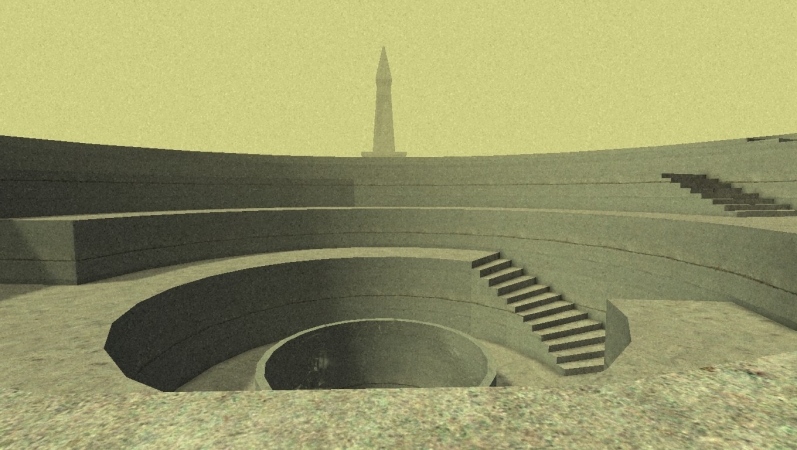Kairo is a first-person atmospheric puzzle game, or what many would refer to as a “walking simulator.” All interaction with the world and the puzzles is done through manipulating the player’s position. The only things you can do in the game are walk, run, jump, and look around.
While the game never explicitly gives you a goal, the spaces and puzzles slowly guide you to set the machinery of the world into motion, unlocking new areas. At any time you can go explore the places you have already been; there are no one-way gates blocking you from going back, though there’s not much of a reason to do.

There is no text in the game, save for the menus and a few lines after the credits. All of the story is told through environmental details, visuals, and excellent sound design. The story slowly unfolds as you discover images and sculptures. There are plenty of hidden areas that lead to scenes that also help tell the story, but they are very, very difficult to find. They are only necessary for the secret ending.
The story is told non-linearly and starts in medias res. The story isn’t really about you, it’s about Kairo and what it does and why it exists. Who you are is relatively inconsequential to the plot; anyone could take your place and it would function the same. Because of all these factors, the story can be somewhat difficult to fully make out, though I thought it was clear enough to keep me motivated. Feel free to look up the plot once you finish, the creator of the game has confirmed that several analyses of the game’s plot were correct.

I really like Kairo, but it’s not for everyone. If you like walking simulators, you’ll probably enjoy it. The atmosphere of the game is incredible, with a unique visual style and a haunting soundtrack. If you don’t like games entirely based around atmosphere and exploring empty spaces, there’s not much to do in the game other than think and look at the cool architecture.
Relation to Avant-Garde Videogames : Playing with Technoculture
If I had to put this game on the Radical-Complicit/Political-Formal chart that Schrank uses organize the chapters in his book, I’d place it as Complicit and somewhere between Political and Formal. The game doesn’t really do anything radical, but the gameplay of walking around in Kairo alone leads to deeper meaning when placed in the context of the story that the game tries to tell. Combining these factors leaves me unsure of how to categorize it other than “somewhere in avant-garde.”
This article describes the game rather well: https://www.rockpapershotgun.com/2013/04/23/wot-i-think-kairo/
MASSIVE SPOILERS AHEAD
The story had Narrative Political elements as suggested by Schrank as well. Throughout the game images of war, disaster, and death are juxtaposed with science, engineering, brutalist architecture, biology, and mathematics. You slowly realize that the game is about the ecological ruin of Earth, and the attempt to persevere humanity and give life a second chance.
The game also has a very interesting puzzle in the area that the game files refer to as the “Skylab.” The game gives you part of the combination for a series of buttons, but what part of the solution is given to you depends on your SteamID. No matter how many times you reinstall the game or switch computers, it will always give you the same incomplete combination. To solve the puzzle, you have to collaborate with others that have the game, or look up a guide online.
By the end, the game suggests that by working together and solving problems humanity can be saved from itself. This attempt of the game to transmit ideas and culture is exactly what Schrank suggests in chapter 7.
